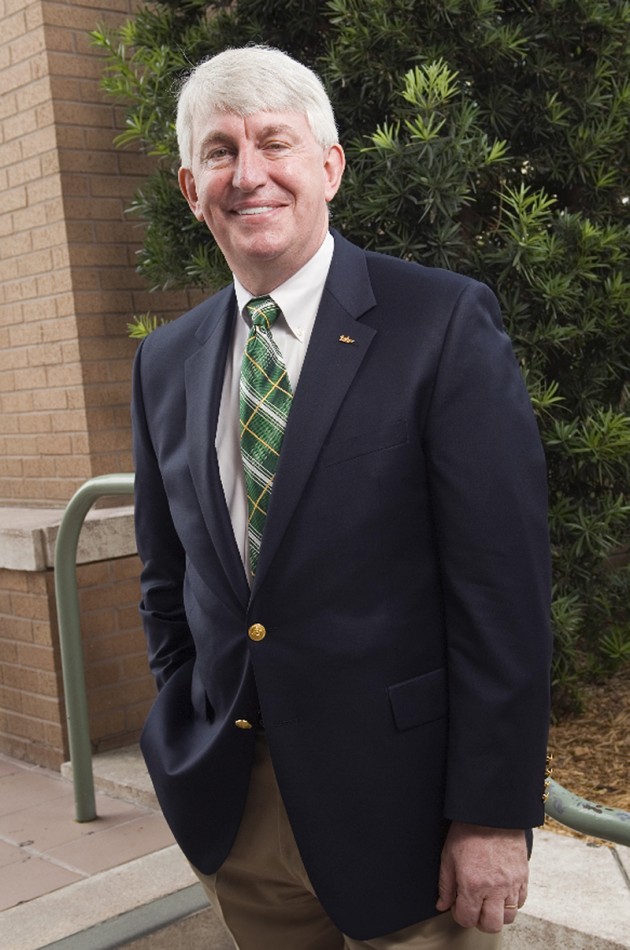USF attempts to make scholarship system ‘user-friendly’

USF is making changes to its scholarship and financial aid system with one main concern in mind — more organization, said Provost Ralph Wilcox.
This new system will feature a more accurate online database that includes every scholarship and source of financial aid available at the University.
Students will be able to search for scholarships and financial aid they are eligible for based on things such as their grade point average, financial status and class standing.
“We’ve never done that before,” Wilcox said. “We haven’t particularly made it user-friendly. It’s really, I suppose, these tough economic times that have driven us to be more student and user-friendly, because it’s in our best interest to have happy students that succeed academically.”
Wilcox said USF has brought “transparency” and “logic” to the restructured system.
The soon-to-be established Office of University Scholarships and Financial Aid (USFA) will house the new system.
The USFA will be established as part of the financial aid department July 1. The new office will hold the duties of reviewing, approving and packaging all financial aid given to students.
The USFA will be managed by Director of Financial Aid Billie Jo Hamilton. The office was allocated $96,000 by Wilcox for three new positions.
Associate Director of Financial Aid Steve Runion will head the office. The other two positions have not been filled.
The office will operate under the University’s Scholarship Administration Guidelines, which govern scholarship funding, the establishment of scholarship criteria and databases, and determinations of student eligibility.
This new system will enforce stricter guidelines for the amount of scholarships awarded to one student.
“It doesn’t make sense for (one student) to get $20,000 while (another student), who has need, does not get a penny,” Wilcox said.
Wilcox said better communication between colleges and other departments will assist in ensuring a fair distribution of scholarships.
“The Office of University Scholarships and Financial Aid will be responsible for packaging (scholarships),” he said. “The awards will be made through one central office.”
There will be limitations on students’ abilities to get multiple scholarships from separate colleges and departments, Wilcox said, and those scholarship packages will be evaluated by the USFA.
Students were able to accumulate federal, University and endowment scholarships that totaled more than their tuition because no one was monitoring each individual student. The students could then put the extra money in the bank, Wilcox said.
The USFA will have all student financial aid records and will communicate with the USF Foundation, which gives endowment scholarships, and individual colleges and departments before offering a scholarship. The office will have access to federal financial aid records as well.
The office will offer scholarships in three categories: opportunity, excellence and passport.
Opportunity scholarships will be based upon students’ unmet financial need. Excellence scholarships will be based upon merit. Passport scholarships will support student engagement in global literacy and impact.
“Students mix and match based on eligibility. Not all students who have need will be eligible for merit-based scholarships,” Wilcox said. “Not all bright students who were receiving excellence-based scholarships will be eligible for need-based.”
If more students accept scholarship offers than the University anticipates, it must find extra funding for those scholarships.
Wilcox said this has never happened at USF and he does not expect it to happen this year.
“We look at history so we have a good sense of acceptance rate over time,” he said. “Now, we realize in difficult economic times that need grows and we fully anticipate that we’ll get more students accepting higher amounts of scholarship awards than they have in the past.”
The University uses FAPAK, a five-year plan that includes all sources of funding for financial aid and scholarships: federal and state funds, University revenue and private money from the USF Foundation.
Wilcox said none of the $15.1 million received in federal stimulus dollars will fund financial aid or scholarships but a portion of the tuition increase will go toward scholarships.
The Board of Governors and USF’s Board of Trustees approved a 7 percent differential fee increase in tuition last month.
Wilcox said USF expects to receive $5.7 million in total revenue from the differential fee increase. Thirty percent of that — $1.7 million — will be put into FAPAK to fund need-based scholarships.
Bob Spatig, director of admissions, said 75 percent of all FAPAK funds must fund need-based scholarships.
Wilcox said the new system will be better for both students and the University.
“Students are going to see just a tremendous improvement in communication,” he said.





